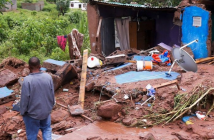- The SA president has appointed a special 10 member land reform advisory panel.
- For now, there is no identified threat to existing and future renewable energy projects in South Africa.
- However, the new laws in the hands of a populist president fostering a developmental state will have dire consequences to not only the renewable energy sector but the entire economy as we know it.
South Africa is about to table a bill that will set out a system of land expropriation without compensation. It has caused much concern with local and international stakeholders active in the country’s renewable energy program (REIPPP). As more clarity becomes evident is there still a cause for concern?
Not according to Deputy Minister of Public Works, Jeremy Cronin, who comments that the new bill will be ‘light touch’ legislation and adds “it will ensure an administratively just process”. He adds that “the new law will give expression, procedure and form to any constitutional amendments to make more explicit the grounds under which expropriation without compensation can take place”.
Specifically, the procedure will:
- Ensure the expropriator has exercised his or her mind;
- Provide that a notice of intention be sent to the local municipality and all affected parties;
- Make provision for objections within 30 days;
- Issue a notice of expropriation plus an offer of compensation which could be nil, thus making it an expropriation without compensation; and
- Make provision for counter-proposals.
In his address, Cronin identified land and property that could be expropriated without compensation as abandoned buildings, unutilised land, commercial property held unproductively and purely for speculative purposes, underutilised property owned by the state, and land farmed by labour tenants with an absentee titleholder.
South Africa’s President, Mr Cyril Ramaphosa, also calmed concerned in his recent economic stimulus package address. The President announced a special 10 member land reform advisory panel. Ramaphosa said the panel is “eminently qualified by virtue of academic background, professional experience, social entrepreneurship or activism related to the agricultural economy and land policy”.
The President added that the “advisory panel on land reform will support the Inter-Ministerial Committee on Land Reform chaired by Deputy President David Mabuza. The panel is expected to provide perspectives on land policy in the context of persisting land inequality, unsatisfactory land and agrarian reform and uneven urban land development”.
What is becoming increasingly evident is that the new bill is going to be intelligently navigated and managed by the incumbent leadership and its implementation will be selected according to specific criteria. For now, there is no identified threat to existing and future renewable energy projects in South Africa.
This may change if Ramaphosa loses power in the upcoming national elections to be held in early 2019. The new laws in the hands of a populist president fostering a developmental state will have dire consequences to not only the renewable energy sector but the entire economy as we know it.
Author: Bryan Groenendaal















